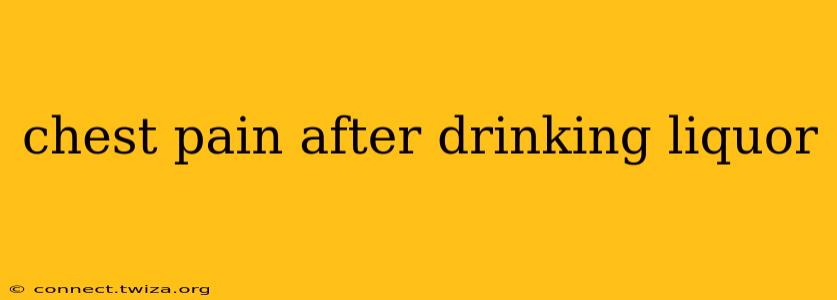Experiencing chest pain after drinking alcohol can be alarming. While sometimes it's a minor discomfort that resolves quickly, other times it can signal a serious medical problem. This comprehensive guide explores the potential causes of chest pain after consuming liquor, when you should seek immediate medical attention, and steps you can take to prevent future occurrences.
What Causes Chest Pain After Drinking Alcohol?
Several factors can contribute to chest pain following alcohol consumption. These range from relatively benign issues to life-threatening conditions. Understanding the possibilities is crucial for appropriate action.
-
Heartburn or Acid Reflux (Gastroesophageal Reflux Disease or GERD): Alcohol relaxes the esophageal sphincter, allowing stomach acid to flow back into the esophagus, causing burning chest pain. This is a common cause, particularly after consuming large quantities of alcohol or strong spirits.
-
Gastritis: Alcohol irritates the stomach lining, leading to inflammation (gastritis). This inflammation can cause upper abdominal pain that may feel like chest pain.
-
Pancreatitis: Excessive alcohol consumption can trigger pancreatitis, an inflammation of the pancreas. This condition can cause severe abdominal pain radiating to the chest, accompanied by nausea and vomiting.
-
Cardiac Issues: While less common, chest pain after drinking could indicate a more serious cardiac event, such as angina (chest pain due to reduced blood flow to the heart) or a heart attack. Alcohol can affect heart rhythm and blood pressure, potentially exacerbating underlying heart conditions.
-
Anxiety or Panic Attacks: Alcohol can worsen anxiety, potentially triggering panic attacks with associated chest pain, shortness of breath, and rapid heartbeat.
-
Muscle Strain or Injury: Sometimes, the pain is not directly related to the alcohol but aggravated by it. For example, a pre-existing muscle strain in the chest area could be exacerbated by alcohol's dehydrating effects.
-
Esophageal Spasm: Alcohol can trigger spasms in the esophagus, causing sharp chest pain.
How Can I Tell If My Chest Pain is Serious?
Differentiating between harmless discomfort and a medical emergency requires attention to several factors. Seek immediate medical attention if you experience:
- Severe, crushing chest pain: This is a classic symptom of a heart attack.
- Chest pain accompanied by shortness of breath, sweating, nausea, or dizziness: These are additional signs of a potential heart attack or other serious condition.
- Sudden, sharp chest pain that radiates to the arm, neck, jaw, or back: This could indicate a heart attack or other cardiac emergency.
- Chest pain accompanied by difficulty swallowing or vomiting blood: This suggests potential esophageal issues or bleeding.
- Chest pain that worsens with deep breaths or coughing: This could be a sign of a lung problem or other serious condition.
What Should I Do If I Have Chest Pain After Drinking?
If you're experiencing chest pain after drinking, the first step is to stop drinking immediately. Rest in a comfortable position and try to relax. If the pain is mild and subsides quickly, you may not require medical attention. However, if the pain is severe, persistent, or accompanied by any of the warning signs mentioned above, call emergency services immediately.
Can Certain Types of Alcohol Cause More Chest Pain Than Others?
While any type of alcohol can trigger chest pain, the higher the alcohol content and the greater the quantity consumed, the higher the risk. Darker liquors like whiskey and bourbon may contain congeners, which can irritate the stomach and exacerbate symptoms. However, all types of alcoholic beverages can have a negative impact on the body if consumed excessively.
How Can I Prevent Chest Pain After Drinking?
Preventing chest pain related to alcohol consumption involves moderation and responsible drinking habits. Consider these strategies:
- Limit your alcohol intake: Stick to recommended guidelines for moderate drinking.
- Drink slowly: This allows your body to process the alcohol more gradually.
- Eat before and while drinking: Food helps to slow down alcohol absorption.
- Stay hydrated: Drink plenty of water alongside alcoholic beverages.
- Avoid mixing alcohol with other substances: This can increase the risk of adverse reactions.
- Address underlying health conditions: If you have GERD, gastritis, or other conditions that might be worsened by alcohol, manage them appropriately with your doctor's guidance.
Disclaimer: This information is for general knowledge and does not constitute medical advice. Always consult a healthcare professional for any health concerns or before making any decisions related to your health or treatment. This information is not a substitute for professional medical advice. If you are experiencing chest pain, seek immediate medical attention.
